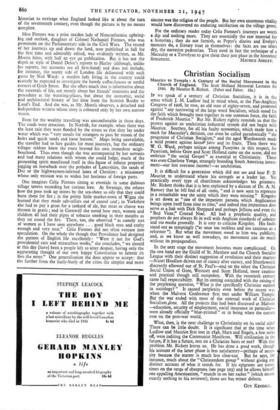Christian Socialism
IF we speak of a century of Christian Socialism, it is in the sense which J. M. Ludlow had in mind when, at the Pan-Anglican Congress of 1908, he rose, an old man of eighty-seven, and-protested against " any narrowing of the large word Socialism, which stood for the faith which brought men together in one common force, the faith of Frederick Maurice." But Mr. Rickett rightly reminds us that the protest against an unchristian industrial system did not begin with Maurice. Southey, for all his faulty economics, which made him a mark for Macaulay's derision, can even be called paradoxically " the progenitor of ChristianSocialism," and the aged Wordsworth made a mild protest against laisseP faire and its fruits. Then there was W. G. Ward, perhaps unique among Puseyites in this respect, for Puseyism, before Gore and Scott Holland came on the scene, did not embrace " the social Gospel " as essential to Christianity. There was even Charlotte Yonge, strangely branding South American invest- ment—our lost overseas income!—as unchristian.
It is difficult for a generation which did not see and hear F. D. Maurice to understand where his strength as a leader lay. Yet practically eve6 type of churchman acknowledges his greatness. Mr. Rickett thinks that it is best explained by a dictum of Dr. A. M. Ramsey that he fell foul of all -isms, " and is now seen to represent in a remarkable way the unity which they were missing." Kingsley is set down as "one of the impatient parsons which Anglicanism brings upon itself from time to time," and indeed that impatience does serve as a link with Dick Sheppard and perhaps Jellicoe and even the " Red Vicar," Conrad Noel. All had a prophetic quality, and prophets do not always fit in well with Anglican standards of sobriety and via media generally. It is easy to criticise Kingsley. His faults stand out so temptingly ("at once too reckless and too cautious as a reformer "). But what the movement owed to him was publicity, and, as we know so well nowadays, no movement can do much without its propagandists.
In the next stage the movement becomes more complicated. On the one hand are the Guild of St. Matthew and the Church Socialist League with their distinct suggestion of revolution and their martyrs —Stuart Headlam driven out of curacy after curacy, and Shuttleworth discreetly elbowed out of St. Paul's—and on the other the Christian Social Union of Gore, Westcott and Scott Holland, more cautious and practical though still outspoken. With the twentieth century came full respectability. But its coming coincided with the raising of the perplexing question, " What is the specifically Christian outlook in sociology? " It caused perplexity even before the recent war, when the Malvern Conference first met under William Temple. But the war ended with most of the external work of Christian Socialism,done. All the projects that had been discussed at Malvern —education, security of employment, social insurance in particular— were already officially " blue-printed " or in being when the curtain rose on the post-war world.
What, then, is the next challenge to Christianity on its social side? There can be little doubt. It is significant that at the time when Ludlow and Maurice first met in 1846, Marx and Engels, a few miles off, were inditing the Communist Manifesto. Will civilisation in the future, if it has a future, rest on a Christian basis or not? With that problem Mr. Rickett leaves us. He has done a good work, though his account of the latter phase is less satisfactory—perhaps of neces- sity because the matter is much less clear-cut. But he says, for instance, much about the "Christendom group" without giving any distinct account of what it stands for. If his epigrams are some- times on the verge of cheapness (see page 103) and he allows himself one appalling Americanism, " muscle in on her racket 7 (which means exactly nothing to his reviewer), those are but minor defects.
GUY KENDALL.


































 Previous page
Previous page